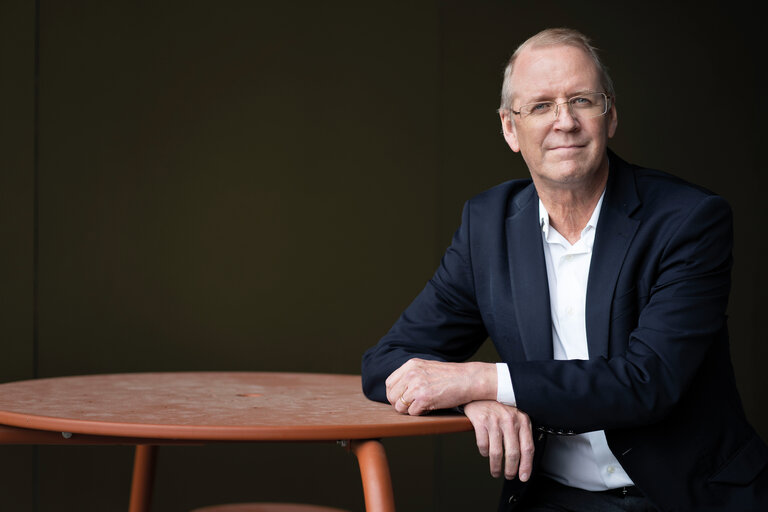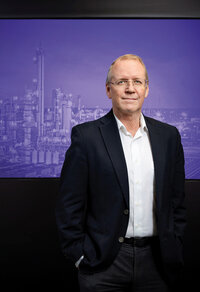
John McNally, CEO INEOS Project ONE: 'Project ONE: the new standard in petrochemicals for decades to come'
Project ONE is the most important and largest investment in the European chemical sector in the last twenty years. With this billion-dollar investment, Antwerp will soon have the most environmentally friendly and energy- and resource-efficient ethylene plant in all of Europe. John McNally, CEO of Project ONE, hopes this project will be the start of a "Renaissance of petrochemicals in Europe."
Twenty years from now, I will show my grandchildren this project with great pride."
John McNally has worked in chemistry for more than 30 years, and sees Project ONE as a real game changer. 'I find it extraordinary and an honor to have Project ONE under my belt after all these years. It's a billion-dollar investment of a scale we haven't seen in Europe in 20 years.'
INEOS' new industrial plant will produce ethylene, an essential building block of products that are part of our daily lives. The ethane cracker will be located in the port area of Antwerp. Not an obvious choice, today. 'In recent years there has in fact been a malaise in European petrochemicals,' John says. 'In 2000, Europe still accounted for 27% of global investment in the chemical sector; today that has more than halved to 12%. Our chairman and founder Jim Ratcliffe wants to change that and decided to invest heavily in Europe. After all, you can't start getting all the products from other continents - that's a geopolitical risk - and he believes that Europe should continue to play an important and strategic role on the world petrochemical stage. Not only to have its own production, but also because of employment.' Indeed, with this investment, INEOS is also creating another 300 high-quality jobs, 150 contractor jobs at the site and a multiple of them indirectly in the region. During the construction phase, millions of man-hours will be made, with about 2,500 contractors at peak periods, including many Bilfinger employees.
Not incineration but conversion
The start of the project was not smooth. The permitting process was lengthy because of appeals filed by activist groups. And even now, certain NGOs continue to litigate with a view to shutting down the project. Almost incomprehensible, John thinks, precisely because this is a state-of-the-art plant that is more economical and environmentally friendly than ever before. 'I suspect the silent majority is not against Project ONE, quite the contrary. But there is a vociferous minority that is against the project, purely because it is an investment in a plant that involves fossil resources. By the way, it is good to know that we are using a fossil product as a raw material, not as a fuel. So it is not burned, but converted into the raw material ethylene. Unfortunately, opponents do not yet seem to see that really almost all of their utensils, from coat to phone to PC, are manufactured using chemistry. And until we have a 100 percent organic alternative, it will stay that way for a while. In any case, with Project ONE we are contributing to modernization and moving fast towards climate-neutral production.
Enemy of good
Project ONE will use the latest production technologies that will allow INEOS to substantially reduce environmental impact and carbon emissions compared to current ethylene production in Europe. This innovation is an important step towards a more sustainable chemical sector. You can't argue with that, you might say. But the reluctance to push ahead in the energy and raw materials transition proves that the best can be the enemy of the good, John believes. 'You simply cannot go from fossil to climate neutral in one fell swoop. Just think about road transport: what if you decided tomorrow that all gasoline and diesel cars should be banned from the roads immediately? Would that move our society forward? I don't think so. What you can do is take the biggest possible steps towards climate-neutral production. And that is exactly what we are doing here in Antwerp. We are not just making an improvement, we are setting a new standard for all petrochemical crackers in the coming decades.'
Hydrogen as fuel
By using the latest technologies, Project ONE's ethane cracker will emit less than half the CO2 than the best-performing comparable plants in Europe. INEOS does this, for example, by using all the hydrogen, a carbon-free gas produced in the production of ethylene, as fuel. This enables as much as sixty percent of the heat requirement for the production processes to be met, resulting in a substantial reduction in CO2 emissions. 'In principle, it is possible to meet almost one hundred percent of our heat requirements in this way, if we gain access to additional large volumes of affordable low-carbon hydrogen in the future,' says John.
Journey will take a while
INEOS is thus doing its best to link the reliable production of everyday applications with climate goals by using the latest technologies. That's why John would like to see the realization sink in even among the average EU citizen that this is the way forward. 'That is a matter of long breath. Until everyone knows that almost everything around you is made by the basic chemical industry, the image of petrochemicals will remain problematic. As far as I'm concerned, that starts in primary education, and then in secondary and higher education. We also need to try to convince young engineers that they should choose our sector precisely to help us make our processes climate-neutral. But this sector-wide message is being hijacked by critical people who think petrochemicals should disappear. Without considering that we need it all too badly. There is no need to ignore the fact that petrochemicals have challenges. And as far as I am concerned, we can be proud that we still have a strong European chemical sector on the road to climate neutrality. But it's a journey that will take a while.’
Renaissance
'Twenty years from now I will show my grandchildren this project with great pride,' says John. 'I honestly hope that this project is the start of a European Renaissance of the petrochemical industry. That we show in Europe what we are all capable of. We have the highest safety, environmental, climate requirements and licensing standards in the world. If we can encourage each other to always follow the best example, we will keep our European industry state of the art. I would like to see many other projects follow, on the way to that clean future of basic chemicals in Europe!
John McNally
John McNally was born in the United Kingdom, but grew up in the United States, where he received his education. He has a Bachelor's Degree in Chemistry from the California Institute of Technology in 1982 and a PhD in Chemistry from Harvard University in 1987. In his 32 years in the petrochemical industry, he worked first for BP and then for INEOS, in various technical, operational and commercial management positions in five countries. John is married and has two sons. Since its inception in Antwerp in 1998, INEOS has grown into an international chemical company with 194 sites and 26,000 employees worldwide. INEOS produces the essential building blocks of various high-performance products that have become indispensable in our daily lives: medicines, hand sanitizers, sterile packaging, pipes for transporting drinking water. You can also find their materials in solar panels and wind turbines, lightweight parts for the automotive industry that reduce fuel consumption, insulation materials and packaging materials that increase the shelf life of food products.

